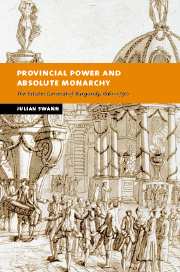Book contents
- Frontmatter
- Contents
- List of illustrations
- List of figures
- List of appendices
- List of map
- Preface
- List of abbreviations
- Map: The duchy of Burgundy in the eighteenth century
- 1 Historians, absolute monarchy and the provincial estates
- 2 Ancien régime Burgundy
- 3 The Estates General of Burgundy
- 4 Nosseigneurs les élus and the officers of the Estates
- 5 The provincial administration: authority and enforcement
- 6 ‘It's raining taxes’. Paying for the Sun King, 1661–1715
- 7 Provincial administration in an age of iron, 1661–1715
- 8 The limits of absolutism: crown, governor and the Estates in the eighteenth century
- 9 Provincial rivalries: the Estates and the Parlement of Dijon in the eighteenth century
- 10 Tax, borrow and lend: crown, Estates and finance, 1715–1789
- 11 An enlightened administration?
- 12 The coming of the French revolution in Burgundy, 1787–1789
- Conclusion
- Appendices
- Bibliography
- Index
7 - Provincial administration in an age of iron, 1661–1715
Published online by Cambridge University Press: 05 July 2009
- Frontmatter
- Contents
- List of illustrations
- List of figures
- List of appendices
- List of map
- Preface
- List of abbreviations
- Map: The duchy of Burgundy in the eighteenth century
- 1 Historians, absolute monarchy and the provincial estates
- 2 Ancien régime Burgundy
- 3 The Estates General of Burgundy
- 4 Nosseigneurs les élus and the officers of the Estates
- 5 The provincial administration: authority and enforcement
- 6 ‘It's raining taxes’. Paying for the Sun King, 1661–1715
- 7 Provincial administration in an age of iron, 1661–1715
- 8 The limits of absolutism: crown, governor and the Estates in the eighteenth century
- 9 Provincial rivalries: the Estates and the Parlement of Dijon in the eighteenth century
- 10 Tax, borrow and lend: crown, Estates and finance, 1715–1789
- 11 An enlightened administration?
- 12 The coming of the French revolution in Burgundy, 1787–1789
- Conclusion
- Appendices
- Bibliography
- Index
Summary
In the face of the relentless fiscal pressure exerted by the government of Louis XIV, the Estates of Burgundy had proved effective in protecting their own privileges and the interests of local elites. Bargaining over taxation, contracting loans and securing concessions from the crown were, however, only part of the story. Once these matters had been settled, it was the responsibility of the chamber of élus to supervise the collection of tax revenues and to cope with any problems arising from, for example, the provision of military étapes, or the raising of the militia. They were also expected to meet the challenge posed by a series of emergencies, notably the subsistence crises caused by the harsh climatic conditions of the late seventeenth century. It was a demanding brief, and the only historian to have examined the provincial administration in detail during this period was damning in his assessment of its actions.
Citing the criticisms contained in the various remarques of the alcades and conseils des états, Thomas wrote scathingly of the incompetence of the élus. He claimed that the provincial administration was a lethargic and hidebound institution, arguing that ‘all the great administrative projects, the stud, manufacturing, the forests, the canals, the bridges and highways, would have remained in neglect if the central government had not pushed and prodded the sloth and ignorance of the provincial government’.
- Type
- Chapter
- Information
- Provincial Power and Absolute MonarchyThe Estates General of Burgundy, 1661–1790, pp. 194 - 229Publisher: Cambridge University PressPrint publication year: 2003



